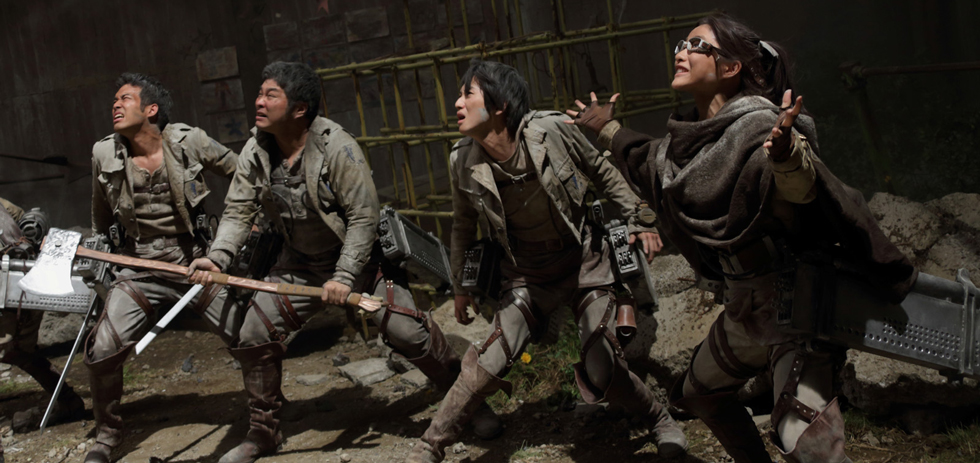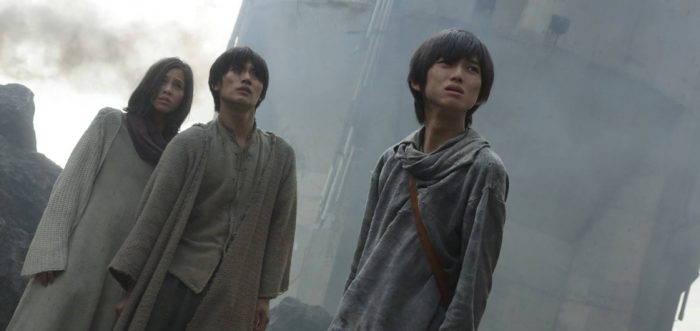
Live action adaptions of beloved animated series rarely go well – The Last Airbender, Dragonball: Evolution and Transformers all stand testament to that fact. When every frame is created, there’s room for strange creatures and physics-defying action sequences, plus the added advantage of any effects fitting into the existing animated aesthetic. Once those worlds become real, the ‘real’ elements – human beings, props, sets etc – inevitably clash with the special effects on a purely visual level, without considering the inhibitive costs.
In some ways, therefore, it’s a good thing that the first of Shinji Higuchi’s two part live action adaption of Attack on Titan includes so few of the most popular elements of the show. The Spider Man-esque omnidirectional movement gear that allows for such intense and high energy action in the anime isn’t employed until the last half hour of the film, and even then sparingly so. The eponymous Titans do appear, although in a far smaller numbers, and are still absent for a decent chunk of the film. When they do appear, they are unsettling more than terrifying – strange, ventriloquist doll interpretations of a human body, one of whom looks disturbingly like Joseph Gordon-Levitt. The lack of the apparatus and impetus behind most of the original action set pieces means that the film occupies a strange space in adaption – what was once an adventure-action-horror piece instead becomes a contemplation on humanity in war. Training montages are swapped for arguments on masculinity, high stakes action is exchanged for tense human interaction, and scenes of destruction become poignant rather than purely aesthetic.
In plot terms, the film vaguely resembles its source material – humanity is confined to a walled city, free from the carnivorous Titans, until that wall is breached and the outer agricultural district is almost entirely wiped out. After two years, food supplies have run so low that the scout regiments launch a last ditch attempt to repair the wall – a plan involving Eren and Armin, survivors of the original Titan genocide. The journey to the wall takes up most of the film, and the narrative doesn’t go past the eighth episode of the anime while hinting at Hunger Games-esque plot machinations from the manga and laying the way for the second part.1
It would perhaps be kindest to consider the film as a separate entity in the same world as the anime and manga, where character names just happen to be shared. Eren’s teen angst is still there, although it doesn’t fit well on 23 year old Haruma Miura. Kanata Hongo’s Armin is quietly optimistic enough, until he completely disappears about halfway through the film. The biggest casualty of mischaracterisation is Kiki Mizuhara’s Mikasa – her backstory is a necessary victim of feature length time constraints, but her helplessness in the first act is inexcusable, to the point where she is literally eaten by a Titan because she can’t move whilst holding a baby.2 When she does reappear later, in a twist which will surprise no one and I therefore feel no guilt revealing, she’s a little closer to the determined, borderline cold character that we all know and love, but at the same time is reduced to little more than a romantic prize to be scuffled over. New character Hiana (Ayame Misaki) does a decent job of filling her place, until she goes all woman-y and gets herself (and several other people) killed.

The film draws on horror movie staples – over-enthusiastic sound design, jump scares, buckets of blood and dying hands up against glass all show up, although some with more success than others. The actual sets of the film are impressive, and the destruction and impact of the Titan attacks becomes palpable in the physical environment. The film itself, however, constantly feels as though it is building towards something that never quite happens. There’s a solid final action scene, certainly, but it lays too many baits that aren’t followed – a strange, hooded figure appears literally twice in the film, solely to ruin Armin’s day, and the explanations of character reappearances are weak at best. Characters are introduced and never explored, as are examples of the harsh home-front. The acting isn’t great, but it’s hard to tell whether that’s the fault of the actors or the ham fisted script.3
It’s easy to list the film’s problems, especially when it’s so far from such a popular source material, but it does have some strengths. The Colossal Titan in the opening sequence is impressive, as is the appearance of another important Titan in the final scenes4 – these final scenes are the strongest of the film, and feature heavily in all promotional material. The destruction of the first Titan attack is genuinely brutal, especially a scene where a previously safe customs station becomes a Titan lunch box. Watching Sasha (Nanami Sakuraba) almost making out with a plate of mashed potatoes is funny without any knowledge of the anime and manga. A rehash of that old horror movie trope of the teenagers sneaking away to have sex during chaos is unintentionally hilarious, and only gets worse-better as it goes on to the inevitable, blood soaked conclusion. A scene intended as a disturbing power play over both Mikasa and Eren is equally hilarious, with Mikasa’s superior officer and assumed lover Shikishima (Hiroki Hasegawa) feeding her an apple in some kind of choke hold.5
I should clarify that, in a sense, I would recommend this film only to fans of the series. It’s badly-written, it’s choppy, the effects aren’t as good as they need to be and it had lost a lot of the charm and selling points of the manga and anime. The characters are unsympathetic and it’s almost painful to watch Mikasa being stripped of her agency, not by another character but by the film itself. And yet, it’s strangely compelling to watch – trying to connect the characters to who you know them to be and reconcile them with what they are here, figuring out where the plot is headed, discovering exactly how wrong they’ve got it. It’s a little like watching an awkward date across a crowded bar – it’s uncomfortable, it’s unfamiliar, you’re laughing too loudly at things that shouldn’t be funny and it feels wrong, but you just can’t look away.
